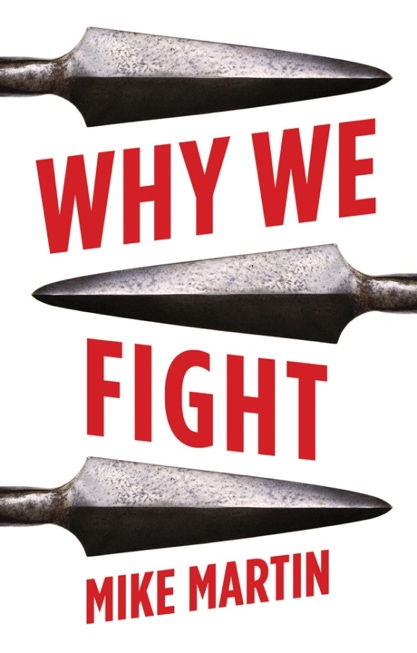Why We Fight explores the question: “Why do human beings fight?” When we go to war, morality, religion and ideology often take the blame. But Mike Martin boldly argues that the opposite is true: rather than driving violence, these things help to reduce it.

While we resort to ideas and values to justify or interpret warfare, something else is really propelling us towards conflict: our subconscious desires, shaped by millions of years of evolution.
Drawing from evolutionary biology Martin argues that the motivation to fight comes from the pursuit of social status and belonging.
Martin explores how the evolution of the brain has shaped human behaviour in violence and war. He critically examines how violence is rationalised through mechanisms such as morality, religion and shared ideology. Drawing on his experience as a soldier, and as a scholar of biology and conflict, Martin effectively deploys recent discoveries in psychology and neuroscience. He explores how these insights completely change the way we view conflict and conflict resolution, terrorism and counter terrorism, and peace and war. It has radical implications for policies for conflict reduction: identity and status need to supplant interests and ideology as the focal points for change.
Martin is a former British Army officer who pioneered, designed and implemented the British Military’s Cultural Advisor programme. During this period, he also worked as an advisor to four commanders of the United Kingdom’s Task Force Helmand, in Helmand province, Afghanistan, advising the commanders on local and national population dynamics. Martin subsequently read for his PhD in war studies at King’s College London (his undergraduate degree was Biological Sciences at Oxford). He wrote an oral history of the conflict in Helmand province from 1978-2012, which he later turned into a critically-acclaimed book, An Intimate War: An Oral History of the Helmand Conflict (Hurst 2014). Martin is a presently a visiting research fellow at the Department of War Studies, King’s College London.
Why We Fight contains comprehensive end notes, a bibliography and an index. It is an important contribution in the study of conflict. Anyone interested in war and international relations will find much to challenge and intrigue them, and perhaps change the way they think about both violence and human beings.
Contact Marcus Fielding about this article.






